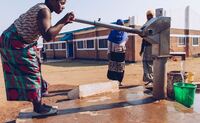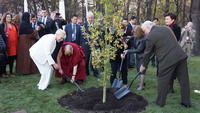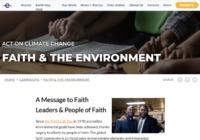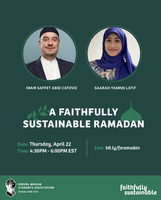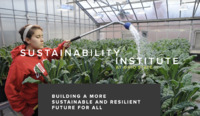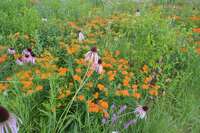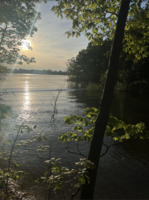Search
143 items
-
American Jewish World Service- Land, Water, and Climate Justice: Story Collection
The American Jewish World Service compiled a website of their outreach stories from the US, Africa, Asia, Latin America, and the Caribbean. Reflections from work with Indigenous communities are included as well. The environmental activism showcased on their website also defend women and their crucial involvement with agriculture and the environment. From the website;
"We aid communities and movements organizing to protect the land, water and natural resources that people depend on for their survival".
More information on how to get involved is listed on their website. -
Mid-Atlantic Coast
Ducks Unlimited is a conservation organization that primary purpose is to restore and protect native duck populations. The article about the MId-Atlantic Coast project is one of Ducks Umlimited biggest ongoing projects currently. The project is to restore and protect the wetlands from Chesapeake Bay to Long Island. The wetlands are a vital location for ducks because of the food, shelter, and safety that they provide. Ducks Unlimited is currently restoring damaged areas and working with local governments to legally protect these areas. Further Ducks Unlimited is working with locals on what they can do to protect and restore the wetlands. The article talks about the focuses of the project along with the partners. -
Religion and Environmental Values in America
"Religion and Environmental Values in America explores the emerging and increasingly important topic of religion and sustainability, with particular attention to first understanding what it takes, philosophically and practically, to overcome polarizing debates about such topics and to understand environmental issues at their roots. The book then examines a range of case studies highlighting key areas of faith-based sustainability solutions." -
Querida Amazonia
This post-synodal exhortation by Pope Francis draws and continues from Laudato Si'. It specifically addresses the region of the Amazon and Pope Francis' ideals for supporting its environment. In summation, he says, "I dream of an Amazon region that fights for the rights of the poor, the original peoples and the least of our brothers and sisters, where their voices can be heard and their dignity advanced.
I dream of an Amazon region that can preserve its distinctive cultural riches, where the beauty of our humanity shines forth in so many varied ways.
I dream of an Amazon region that can jealously preserve its overwhelming natural beauty and the superabundant life teeming in its rivers and forests.
I dream of Christian communities capable of generous commitment, incarnate in the Amazon region, and giving the Church new faces with Amazonian features." -
Querida Amazonia Beloved Amazon Study Guide on Select Themes
"This reflection/discussion guide, for use with Pope Francis’ apostolic exhortation, Querida
Amazonia [Beloved Amazon], can help individuals and small groups explore and dialogue with
aspects of this important document related to listening to “the cry of the poor,” the rights of
indigenous persons, solidarity, and action to care for God’s creation. It does not cover all themes in
the apostolic exhortation. The guide includes a template for small group discussion, as well as
questions for either individual or small group reflection on particular themes in the document." -
Quench Their Thirst
"Welcome to the Quench Their Thirst Fundraising Project!
Water is a basic necessity of life, yet millions of people around the world lack access to this essential resource. By setting up a fundraising page, you can make a difference and help quench the thirst of those who need it most.
The money you raise will build water wells, boreholes and water filtration plants in rural communities in Africa and Asia, where people currently have no choice but to walk for miles to collect dirty, contaminated water. This not only puts their health at risk, but also takes up valuable time that could be spent on education, work, or caring for family members." -
Practical Steps Towards Protection of the Environment
"These days the environment- the source of life for all beings in the world including Tibet, the Land of Snows- is undergoing extensive degeneration. At this time it is extremely important that every human being, according to his or her ability, consistently puts effort into ensuring the conservation and protection of this planet's environment and its inhabitants." -
Hindu Faith Statement on the Environment
This statement consists of three sections reflecting the major strands of Hindu thought: Sustaining the Balance, Sacrifice and Protection, and Breaking the Family. It was compiled as a statement of the stance of the Hindu faith on environmental issues and how to approach nature. -
Saving India’s Rivers: Ecology, Civil Society, Religion, and Legal Personhood
"Abstract: In recent decades, India’s environment has been severely compromised by riverine pollution combined with large-scale dams and exacerbated by diversion for irrigation. Most prominent among the rivers so affected has been the Ganges and its tributaries in northern India, which for Hindus include the country’s most sacred bodies of water. This paper examines three campaigns opposing dam construction, arguably the most widely publicized and analyzed efforts of this kind since independence in 1947. One campaign was essentially secular with virtually no religious component, the second mostly secular with some religious support, and the third almost totally a religious initiative. In the end, only the third attained any real success, and that rested on circumstances unlikely to be replicated. The possibility that future campaigns of this scale can be taken up again appears remote. Meanwhile, riverine pollution has continued to increase everywhere despite massive governmental programs to reduce it. Theoretically, it would seem that environmentalists and Hindu devotees with their veneration of nature should be able to work in common cause to reduce pollution, but any large-scale cooperation seems unlikely between these two disparate realms. More recently an effort to protect rivers by endowing them with legal personhood enjoyed an initial success, holding the promise that lawsuits could be brought on behalf of a river against those polluting it. The paper concludes that while the legal personhood strategy is currently stalled, it offers the best chance for eventual success in attenuating riverine pollution. In the course of the paper, a comparative theoretical framework for assessing anti-dam protests will be tested." -
Earth Day: Faith & the Environment
"Since the first Earth Day in 1970, incredible environmental goals have been achieved, thanks largely to efforts by people of faith. The global faith community is a critical voice in overcoming obstacles and integrating environmental issues into political, social and economic agendas...
Below are EARTHDAY.ORG’s Invest in Our Planet campaigns, as well as resources linking environmental stewardship and faith. We always strive to update and improve our resources. If you know of environmental or faith-based resources, email us at partnerships@earthday.org." -
Its promised land drying, Mormon Church works to save the Great Salt Lake
Due to overuse and climate change, the Great Salt Lake is drying and is estimated to disappear in about five years. In response to this, the Mormon Church of Jesus Christ of Latter Day Saints has started public conservation and water-saving efforts. This article describes these efforts and the role of the Great Salt Lake in the local environment and culture. -
"Tell the EPA"
This email was sent out on the Interfaith Power and Light newletter asking for support in limiting coal ash pollution. It asks readers to reach out to the EPA to advocate in favor of stricter guidelines for coal burning power plants to clean up the pollution that is produced. -
A Faithfully Sustainable Ramadan
"Join us this Thursday April 22nd (#EarthDay ?) as we collaborate with @drexelmsa to discuss how we can actively practice a Sustainable Ramadan that is in line with the Prophetic Sunnah and the Quran, both within our home and with our communities! ?? The discussion will be led by community leaders and sustainability experts Imam Saffet Catovic and Sister Saarah Latif @saarahlatif. ?" -
Sustainability Institute at Ohio State
"The Sustainability Institute collaborates with academic and operations units across the university to advance sustainability and resilience scholarship and activities. We aim to establish Ohio State as a leader in sustainability research and applications; educate and empower students; accelerate campus sustainability and living lab opportunities; grow resources to support these efforts; and catalyze a culture of sustainability." -
Planet vs. Plastics
"For Earth Day 2024, EARTHDAY.ORG is unwavering in our commitment to end plastics for the sake of human and planetary health, demanding a 60% reduction in the production of ALL plastics by 2040." -
SEEDS Sustainability Library
"The SEEDS Sustainability Library is a comprehensive repository of applied student research and knowledge that includes a diverse range of interdisciplinary, student-led research projects that have used the Campus as a Living Lab. These open access applied research reports contribute to a body of knowledge, learning and action to ignite sustainability ideas, policies and practices, enabling the broader community to learn, apply and build on previous research." -
President Carter’s Environmental Roots
This chapter from the student-written book “Emerging Perspectives on Religion and Environmental Values in America” explores the environmental history and values of former President Carter. It discusses how Carter's religion impacted his environmental views and how he acted on those values during his career. Below is the first paragraph of the chapter to introduce the discussion.
"Former President Carter, the peanut farmer turned president, has a long and well-known record. He’s been everything from a farmer, navy man, state senator, then Governor of Georgia, President of the United States, Noble Peace Prize winner, and bible study teacher. What’s not as recognized as his noble peace prize winning post-presidency, or his political career, is his strong environmental policies. In his 4 years in the White House, President Carter did more for the environment than many presidents before and after him. He faced many challenges throughout his presidency, most notably the hostage crisis, and the energy crisis. These major challenges in his tenure have hogged much of the attention of his presidency, and people seem to forget his message of good environmental attitudes. The question is, where did his environmental attitudes come from?" -
An Unfamiliar Outlook: The Partnership of Ecofeminism and Daoism
This chapter from the student-written book “Emerging Perspectives on Religion and Environmental Values in America” explores the interactions between Daoism and environmentalism, feminism and environmentalism, and Daoism and feminism. The history of these philosophies are explored and the author includes her own experiences and thoughts to help discuss the perspective. Below is the first paragraph of the chapter to introduce the discussion.
"It’s not clear how many Daoist ecofeminists are in the world, but I think I may be one of them. Though I was raised as a Baptist Christian, I have found the insights of Daoism, the predominant religion of the homeland of my family, and ecofeminism, the perspective that centers women’s relationship to nature, as complementary to my Christian faith and concern for the environment. I have been able to incorporate this philosophy into my life and found that they are interrelated. My interest in these thoughts was partly sparked by applying to the China Program summer internship with Environmental Defense Fund (EDF), which piqued my interest in learning more about Chinese cultural beliefs. Daoism has played a huge role as a philosophy within Chinese culture for thousands of years, and I am interested in ecofeminism because it is a topic that strongly resonates with me being a woman and its relation to the earth. As someone who grew up having a spiritual and personal relationship with the natural world, I find that many of my values align with the Daoist ecofeminist perspective." -
The Intellectual Martian Society of “Stranger in a Strange Land” by Robert Heinlein
This chapter from the student-written book “Emerging Perspectives on Religion and Environmental Values in America” explores the environmental ethics and spirituality of the book Stranger in a Strange Land. Specifically, the author discusses the importance of water and the environmental impact of the book. Below is the first paragraph of the chapter to introduce the discussion.
"In 1961, the accomplished science fiction author Robert A. Heinlein shared his latest work with the world. In the fashion of a fairytale, Stranger in a Strange Land begins 'Once upon a time,' and goes on to describe the fantastic culture of Mars and its impact on human society. The timing of its publication in the early 1960s allowed for a short digestion period, so that it was ripe in the mind of the counterculture in the latter half of the decade. Themes of religious reform, free love, and a oneness with the cosmos permeate the book, and coincidentally rose to popularity during this time. The alignment of the novel with the counterculture cannot be understated: in 1967, the Freak Scene recorded a song entitled 'Grok!,' an homage to the word coined by Heinlein in Stranger in a Strange Land, and a year later the Byrds referenced water brotherhood in their song 'Triad.' The verb 'grok' even found its way into the vernacular of the counterculture (Blackmore, 1995). Messages about the sanctity of clean water and the positive potential of religion reached tens of millions, securing the legacy of Stranger in a Strange Land as one of the books which shaped religious and environmental values in the United States (Library of Congress, 2012)." -
Earth Friendly Habits: Putting Your Catholic Faith into Action
"We all want to have clean air and water. We all want to leave a healthy planet for our children and grandchildren but the challenges we face can feel overwhelming. This booklet will guide us in the process of creating earth friendly habits. Every week it will feature a quote from a saint, Pope Francis, or Laudato Si’, the encyclical written by Pope Francis, along with a simple idea to consider implementing. Often, there will be information about why we need these changes. Some ideas will be familiar but are worth revisiting. Some will be new. The suggestions might appear small but once enough people act in their own lives, it will start a chain reaction that can only end in a healthier planet Earth. Many of the ideas cost nothing. Some require a small initial investment but will save money in the long run. These steps can improve the environment over the course of a lifetime. Spend some time each week thinking about implementing the suggestion. Learn and adopt strategies that work for you." -
In Minnesota they’re paying homeowners to replace lawns with bee-friendly wild flowers
"Minnesota lawmakers set aside $900K to assist homeowners convert traditional lawns by planting wildflowers, clover and native grasses in an effort to slow the collapse of the state’s bee population." -
USCCB Expresses Gratitude for Restoration of Regulatory Provisions for National Environmental Policy Act
The United States Government approved a rule that added regulations for NEPA and the United Conference of Catholic Bishops supports this change. The reason for the support is that they believe NEPA is vital for ecological and societal safety. -
The Spirit of the Rillito
This article explores the ideas of animism and new animism. Animism is the belief that all things, living and non-living, have a spiritual essence. The author connects this system of beliefs to their local river, the Rillito. -
Religion and Environment Photo
This image was taken in Westerville, OH. While going on a walk I ran into this spot and thought it was nice how so much nature is [near]by and we live urban area. That image meant a lot because it['s] often a place I enjoy going and every year during Earth Day the community gathers and cleans up and [tries] to look out for the earth. -
Catholic Diocese of Columbus: Creation Care Guide
The Creation Care Team of the Catholic Diocese of Columbus has created a Creation Care Guide based on the teachings of Laudato Si’. This guide contains information on energy conservation and efficiency, purchasing and recycling, transportation, and water conservation. Additionally, they have a section on making Laudato Si’ more accessible to younger generations. The inspiration for this guide came from the Archdiocese of Atlanta who wrote a document titled, An Action Plan for the Roman Catholic Archdiocese of Atlanta.






